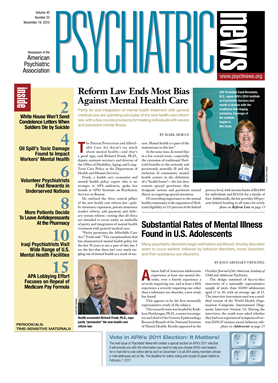Public mental health services in Georgia are expected to improve dramatically as a result of a wide-ranging settlement of a lawsuit against the state that has dragged on for years.
The lawsuit was initially intended to redress the harmful conditions of the state's psychiatric hospitals, but the settlement goes further: it requires the state to commit to a series of reforms in its public mental health system, including a large expansion of its community-based treatments and supports.
The settlement reached by officials in Georgia and the Department of Justice (DoJ) was approved by a federal judge on October 29.
The agreement also applies to people with developmental disabilities. The state must stop admitting people with a primary diagnosis of a developmental disability into state hospitals by July 2011 and instead place them directly into community-based service programs.
Psychiatrists and other mental health advocates said that the agreement's most important benefit is that much of the estimated $130 million it requires the state to spend over five years on mental health services will fund an expansion in community treatment, including 24-hour community “crisis service centers,” psychiatric beds in private hospitals, psychiatric crisis-intervention teams, and other local services.
Georgians who have poorly treated serious mental illness will benefit most directly from the settlement, according to William McDonald, M.D., president of the Georgia Psychiatric Physicians Association (GPPA) and a formal advisor to the governor in the case.
The lack of community treatment and support for this population had placed a large burden on public psychiatry because these patients frequently decompensated and overburdened the underfunded psychiatric hospital system, McDonald said.
Patrice Harris, M.D., chair of the Legislative Committee of the GPPA, described the settlement plan as “a win” for patients in the public system but raised concerns about future financial support from the state to fully implement the agreement.
The governor has called for the legislature to come up with $15 million in the amended annual budget for 2011 and $62 million in the 2012 budget. But the recession could make future increases difficult.
“All involved will have to remain vigilant as we move forward through the implementation phase of this historic agreement,” Harris said.
McDonald is confident that the state will continue to authorize the funding that the settlement requires. He told Psychiatric News that the state already has provided additional mental health funding in recent budget cycles, despite cutting almost every other area of the state government.
Patient advocates from groups such as the National Alliance on Mental Illness plan to maintain pressure on legislators to continue authorizing the necessary funding as well as highlight the potential long-term savings the state may realize by reducing the need for costly inpatient psychiatric care as more patients are stabilized with community care.
“There may be painful costs in the first few years, but it [community care] can be very cost-effective over the long term,” said Robert Bernstein, Ph.D., executive director of the Judge David L. Bazelon Center for Mental Health Law in Washington, D.C., at an October press briefing to discuss the settlement. The Bazelon Center represented a coalition of mental health advocates that advised the judge in the case, United States v. Georgia.
The case stemmed from a 2007 DoJ investigation of published allegations that a large number of patients had died under questionable circumstances in state psychiatric hospitals in the preceding years. The DoJ filed suit after its investigation found systemic problems in the state's public mental health system. The DoJ lawsuit originally focused on the hospital facilities, but the judge increased its scope to allege violations of the Americans With Disabilities Act and the Supreme Court's landmark decision in Olmstead v. L.C., which requires states to provide care in the least-restrictive environment possible.
The plan to expand Georgia's community-based system dovetails with community psychiatry's efforts to move people with severe and chronic mental illness toward recovery through rehabilitation. The approaches of the hospitals will change from simply stabilizing patients to better preparing them for life outside of the hospital by teaching the importance of medication adherence and using the range of clinical and life-skill supports that the agreement requires in their community.
